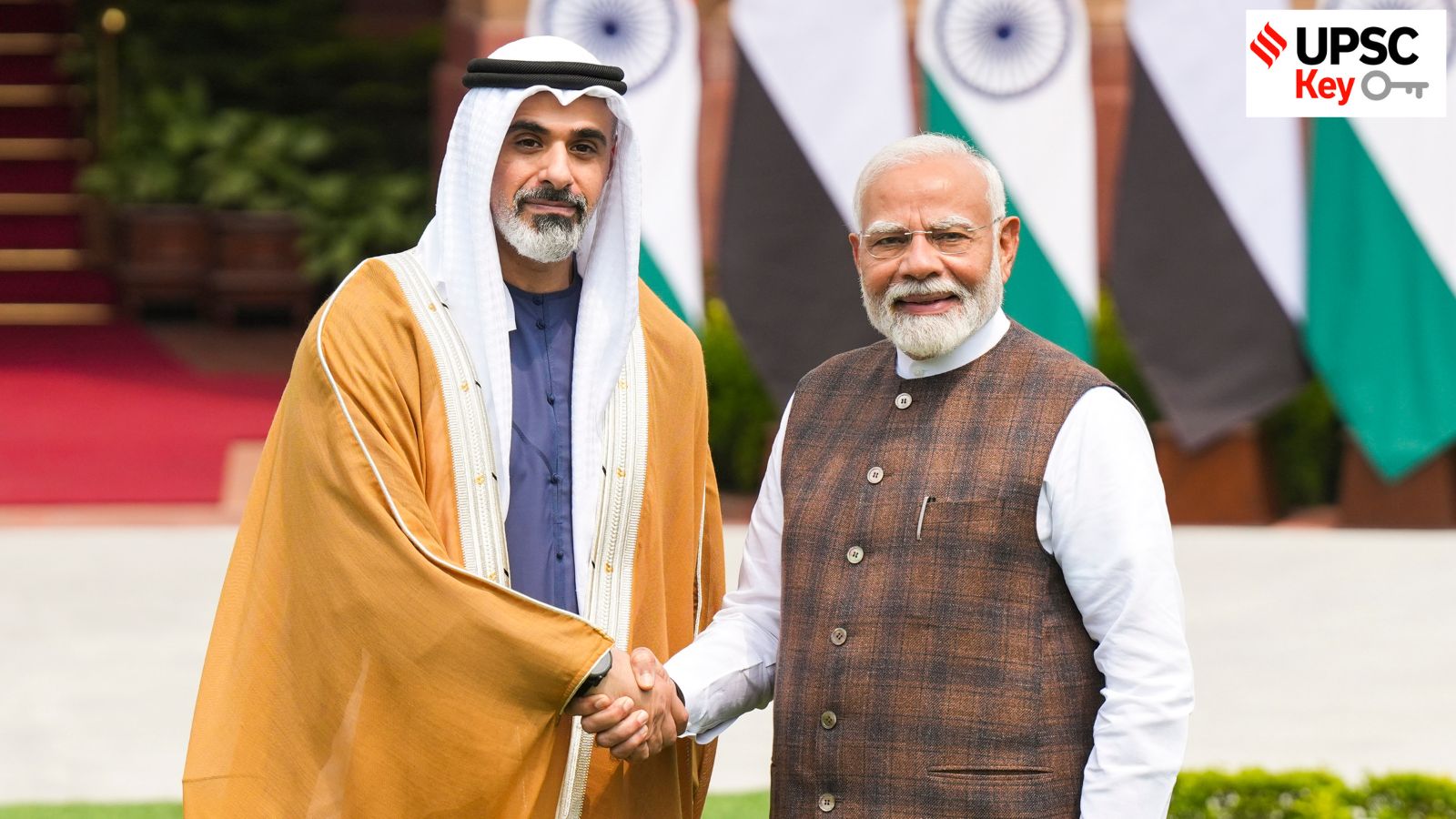Strengthening India-UAE Relations

- 11 Sep 2024
The bilateral relationship between India and the UAE has flourished in recent years, marked by deepening strategic ties and multifaceted collaboration. The recent visit of Abu Dhabi's Crown Prince to India highlights the growing importance of this partnership. The UAE is now India's second-largest export destination, third-largest trading partner, and fourth-largest investor. The Comprehensive Economic Partnership Agreement (CEPA), effective from May 2022, has been transformative, boosting total trade by nearly 15% and increasing non-oil trade by 20% in the 2023-24 period.
Significance of the UAE for India
- Economic Gateway: The UAE is a crucial entry point for India into the Middle East and North Africa (MENA) region. As India's third-largest trading partner, bilateral trade reached USD 84.5 billion in FY 2022-23. The CEPA, removing tariffs on 80% of Indian exports to the UAE, has led to a 5.8% increase in non-oil trade early in 2023 and is expected to elevate trade to USD 100 billion by 2030. The UAE’s strategic location and infrastructure make it an ideal hub for re-exporting Indian goods to Africa and Europe.
- Energy Security: The UAE is India's fourth-largest crude oil supplier, with oil imports surging by 81% in January 2024. The partnership extends to renewable energy projects, aligning with India's goal of 500 GW renewable energy capacity by 2030, underscoring the UAE's role in India's energy transition.
- Investment Catalyst: FDI from the UAE to India has increased more than threefold, reaching USD 3.35 billion from USD 1.03 billion in 2021-22. The UAE-India High-Level Joint Task Force on Investments has played a key role, with significant investments like the Abu Dhabi Investment Authority’s Rs 4,966.80 crore in Reliance Retail Ventures Limited.
- Strategic Partner: The UAE has become a vital strategic ally for India in counterterrorism and maritime security. The bilateral naval exercise "Zayed Talwar" in 2021 and India's access to the UAE’s Al Dhafra air base highlight the expanding defense cooperation between the two nations.
- Remittances and Soft Power: The 3.5 million-strong Indian diaspora in the UAE is a major source of remittances and cultural influence. In 2022, India received nearly USD 111 billion in global remittances, with the UAE as a significant contributor. The diaspora also strengthens cultural ties, as evidenced by the BAPS Hindu Temple in Abu Dhabi, symbolizing the UAE’s commitment to religious tolerance.
- Tech and Innovation Hub: The UAE-India partnership is increasingly focused on technology and innovation. The I2U2 group (India, Israel, UAE, USA) aims to enhance cooperation in clean energy and food security. The UAE’s USD 2 billion investment in food parks in India and the UAE-India Artificial Intelligence Bridge, launched in 2018, facilitate joint research and position both countries at the forefront of technological advancement.
Areas of Friction
- Labor Rights: Persistent labor rights issues for Indian workers in the UAE, including passport confiscation and wage theft, remain a concern.
- Geopolitical Tensions: India’s growing ties with Israel and the UAE’s normalization with Israel complicate the geopolitical landscape, potentially entangling India in regional rivalries, especially with Iran. The UAE’s increasing ties with China also add strategic complexity.
- Energy Transition: Both nations’ commitments to net-zero targets—India by 2070 and the UAE by 2050—pose challenges to their traditional hydrocarbon-based relationship.
- Trade Imbalance: Despite growing trade, India’s trade deficit with the UAE stood at USD 16.78 billion in FY 2022-23. While the CEPA aims to address this, diversifying trade beyond hydrocarbons remains a challenge.
- Maritime Security: Coordinating responses to maritime security threats while respecting strategic autonomy is challenging. The UAE’s expanding naval presence and India’s growing maritime footprint require careful coordination.
Enhancing Relations
- Digital Diplomacy: India could use its IT capabilities to develop digital platforms for collaboration, including a real-time trade portal and a joint innovation hub, and expand cross-border digital payments.
- Green Energy Corridor: Proposing an "India-UAE Green Energy Corridor" could align with both nations’ climate goals through joint investments and research in renewable energy.
- Skill Bridge Program: A "Skill Bridge Program" could upskill Indian workers for the UAE job market, focusing on emerging sectors like AI and sustainable technologies.
- StartUp Synergy Scheme: Developing a "StartUp Synergy Scheme" could foster collaboration between Indian and UAE startups through joint incubation programs and market access facilitation.
- Maritime Cooperation Blueprint: Creating a comprehensive "India-UAE Maritime Cooperation Blueprint" could enhance collaboration in maritime security, blue economy initiatives, and port development, including joint patrols and deep-sea ports.
